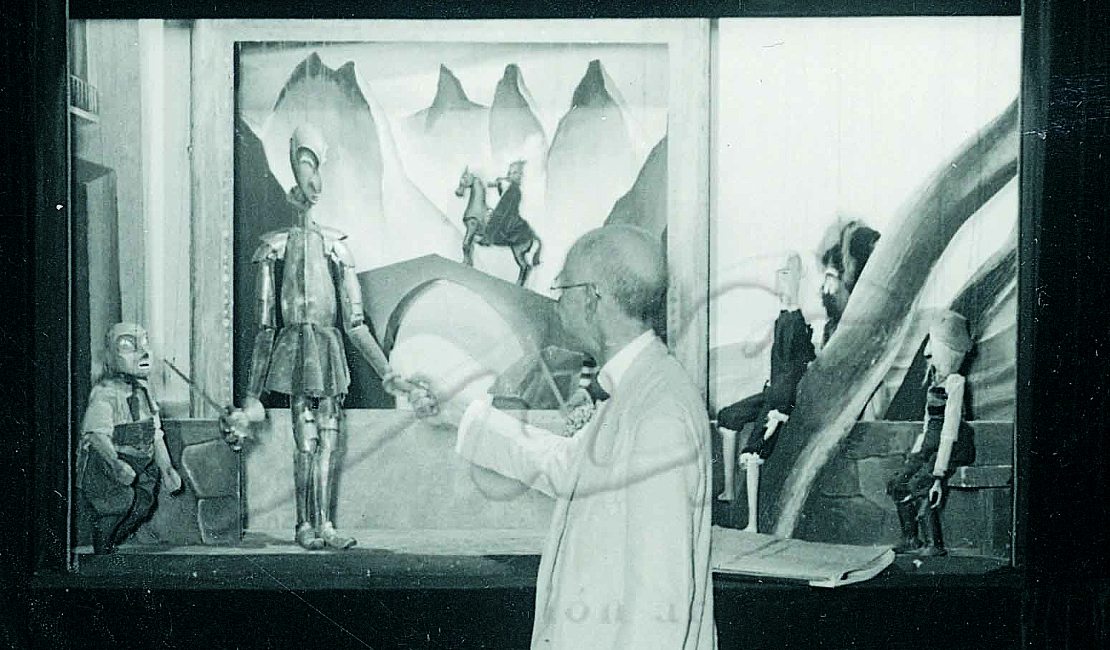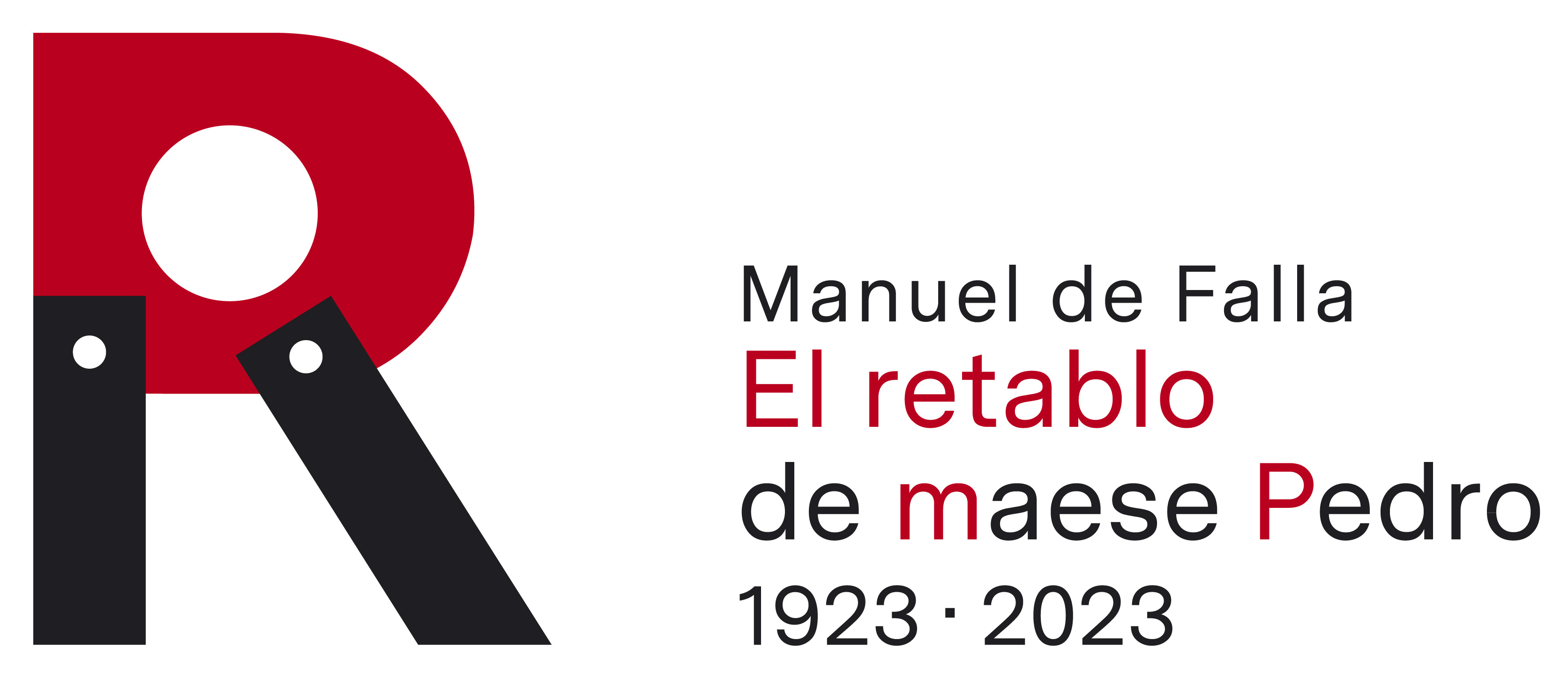The Centenary of the premiere of El retablo de maese Pedro by de Falla in 2023

In 1923, the premiere of Manuel de Falla’s masterly puppet opera El retablo de maese Pedro (1922) was staged at the Palace of the Princess of Polignac in Paris to an rapt audience of leading poets, musicians, and painters of the time including Stravinsky, Poulenc, Pablo Picasso and José Maria Sert.
Admired for its quality from the opening night, El retablo de maese Pedro went on to become one of de Falla’s most seminal works and still remains as popular today, with several notable performances in 2023. Included in the centenary celebrations is a touring exhibition across several Spanish cities, a soon-to-be published book, and conferences with workshops in Montpellier/Paris, plus several high-profile performances.
The Opera
Uniting the magical world of opera with puppet theatre, this one-act opera tells the story of one of the most exciting and humorous episodes of Miguel de Cervantes’ classic book, Don Quixote. The story is taken from the second part of Don Quixote, chapters XXV and XXVI. A travelling showman arrives at the inn where Don Quixote and Sancho Panza are resting and puts on a performance with his puppet theatre, enacting the tale of the rescue of a Spanish princess from Moorish captivity by a knight from Charlemagne’s court. The narrator tells the story with such convincing involvement that during the final pursuit of the escaping couple, Don Quixote, himself, launches into the attack on the puppet pursuers, cutting them to shreds.
The staging combines within a single space, a double story set – a play-within-a-play approach – with large puppets representing Quixote, Master Peter, and those attending the performance of a puppet show, and then smaller figures for Master Peter's puppets in the puppet show itself. The three singers – soprano (boy), Tenor, Bass-baritone – would be with the orchestra in the pit, rather than onstage.
De Falla went on to tour the piece quite successfully throughout Spain with the Orquesta Bética, a chamber orchestra he had founded in 1924 and was a great success for the Spaniard, with performances and new productions all over Europe within a few years of the premiere.
The Music
The score of El retablo de maese Pedro for a small orchestra, was a change in direction from de Falla’s earlier works, such as El Sombrero de Tres Picos (The Three-Cornered Hat), that highlighted a new and surprising de Falla on the international stage. The music abandoned the then popular Andalusian tastes of the time in favour of medieval and Renaissance relevant music of 20th century neoclassicism. The use of the then-unfamiliar sound of the harpsichord was a stroke of genius, creating a unique, virtuosic sound of a great richness. The blend of music and libretto is one of the greatest achievements of the work: with the Spanish language in the piece finding genuine musical expression.
Composer Joseph Horowitz described it best:
“The work is surprisingly theatrical. It bristles with wit and limitless panache. It percolates with such subtle details as Don Quixote's long and ungainly legs – the only part of him which remains visible once Master Peter's production begins”
Concert Dates in 2023
February 17
Auditorium of Girona, Girona, Spain
February 18
Teatro Real, Madrid, Spain
Mahler Chamber Orchestra
Pablo Heras-Casado, conductor
March 23–24
Palacio Euskalduna, Bilbao, Spain
Per Poc, Bilbao Orkestra Sinfonikoa
Santi Amal and Anna Fernández, direction
March 24
Espacio Turina, Sevilla, Spain
Orquesta Bética de Cámara
Michael Thomas, conductor
April 19
Kennedy Center, Washington, USA
PostClassical Ensemble
Ángel Gil-Ordoñez, conductor
In November a special concert by Orquesta Bética de Cámara at the ‘Festival de Música Española de Cádiz Manuel de Falla’ will take place in Cádiz, Spain.
The 29th Encuentros Manuel de Falla, which will take place every November, will feature a wide range of concerts, exhibitions and conference-recitals in the Spanish cities of Granada and Cádiz.

A page from the El Retablo de Maese Pedro score
Book
The publication of a book "Hark, now the blast of the trumpets..." with studies from various fields (music, puppets, the Princess's salon, literature...), compilations (on criticism, studies, discography, productions...), documents and images of relevant performances and set designs from 1923 to the present day.
Under the scientific coordination of Alfredo Aracil, this book includes specific studies by Yvan Nommick (on the music and the process of composition), Enrique Lanz and Yanisbel V. Martínez (on the puppets, in the first performances and in those that have followed over time), Myriam Chimènes (on the cultural salons in Paris in those years, and especially that of the Princess E. de Polignac), Andrés Soria Olmedo (on Cervantes and literature in Falla's life and work) and Antonio García Bascón (on the plastic artists who have been confronted with this creation), as well as a catalogue of reviews, preceding studies, discography and theatrical productions since its premiere in 1923, by Katia-Sofia Hakim.
Exhibitions
An exhibition on El retablo de maese Pedro curated by Elena Torres Clemente will feature information, original documents, and reproductions of some fundamental pieces of the opera including puppets, manuscripts, posters and images. IK-arquitectos studio oversee the design, configuration, and lighting.
The exhibition will open in Granada, in the Museo Casa de los Tiros, during the ‘Festival Internacional de Música y Danza’, and will close the year at the Residencia de Estudiantes, in Madrid.
The event ‘Encuentros Manuel de Falla’, held in Granada and Cádiz in November, includes an exhibition “Un retablo para un Centenario Maese Pedro” by Carmen González Castro.
There is also work ongoing within the cataloguing and study of the epistolary of de Falla, and in 2023 specifically related to the creation of El retablo de maese Pedro, within the framework of the R+D+i project "Epistolary of Manuel de Falla: digitalisation, transcription, edition and international dissemination", directed by Antonio Martín Moreno and Joaquín López González, for its digitalisation and inclusion in the ‘Portal de Archivos Españoles (PARES)’ and Europeana, the European Union's portal of historical heritage archives.
There are already some publications and monographs that represent an important update of the main sources of the work, such as the revised edition of the score published by Chester Music, part of Wise Music Group.

2023 sees a range of talks and conferences scheduled
An international conference on El retablo de maese Pedro will also be held in Paris in Spring, organised by the Universidad Complutense de Madrid and the RIRRA 21 research centre of the Université Paul-Valery Montpellier 3 titled "Correspondences between music and literature in the Silver Age", coordinated by Elena Torres Clemente and María Nagore.
In July there will be workshops for creation, knowledge, and debate on El retablo de maese Pedro, organised by the Archivo Manuel de Falla.
The centenary will officially conclude in Madrid on 11 December 2023 in the ‘Caja de las Letras’ of the ‘Instituto Cervantes’, with the opening of the vault corresponding to Manuel de Falla, where a manuscript of El retablo de maese Pedro was once deposited. This manuscript will be included in the exhibition “El pasado presente”, at the ‘Residencia de Estudiantes’, in Madrid, during the month of December and the beginning of 2024, continuing these centenary activities and the legacy of de Falla’s El retablo de maese Pedro in the future.
And lastly, throughout 2023, the ‘Instituto Cervantes’ will host the centenary portal on its website, with a list of activities and initiatives related to El retablo de maese Pedro, as well as the regular publication, by the ‘Archivo Manuel de Falla’, of documents, information and history that will keep the page up-dated for those interested anywhere around the world.
To commemorate the centenary, the ‘Archivo Manuel de Falla’ is working with a growing number of institutions, such as: Acción Cultural Española, Instituto Cervantes, Fondation Singer-Polignac, Ministerio de Cultura y Deporte, Consejería de Turismo, Cultura y Deporte de la Junta de Andalucía, Real Academia de Bellas Artes de San Fernando, Ayuntamiento de Granada, Ayuntamiento de Sevilla, Centre Européen de Musique in Paris, Universidad de Granada, Universidad Complutense de Madrid and Université Paul-Valéry Montpellier 3, among others. The main initiatives are listed above.
(Nov 2022)

